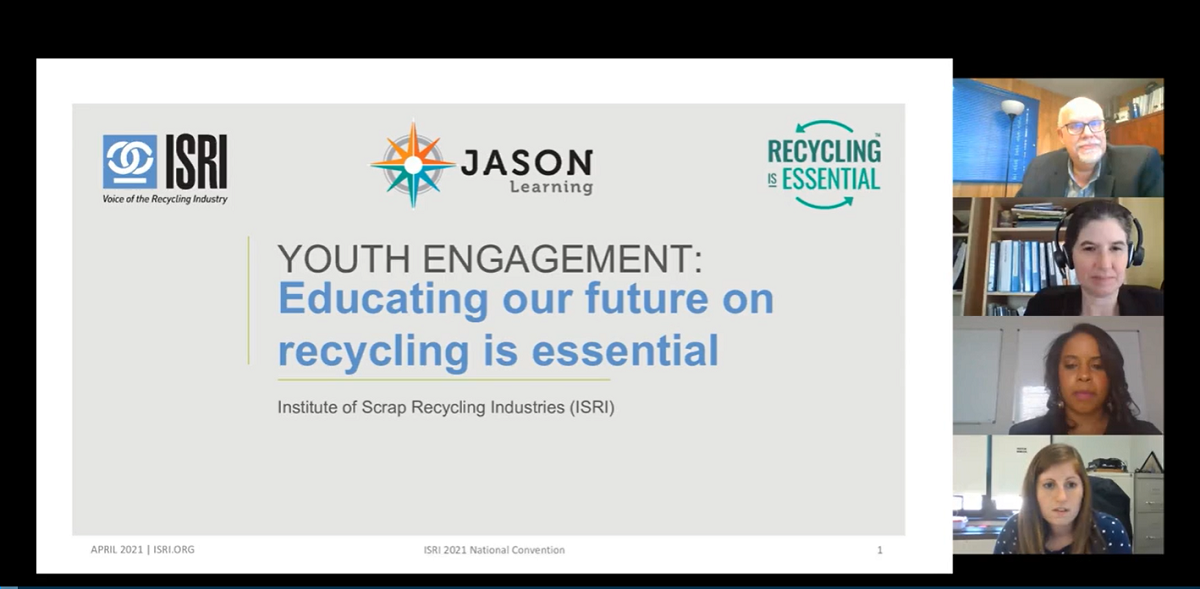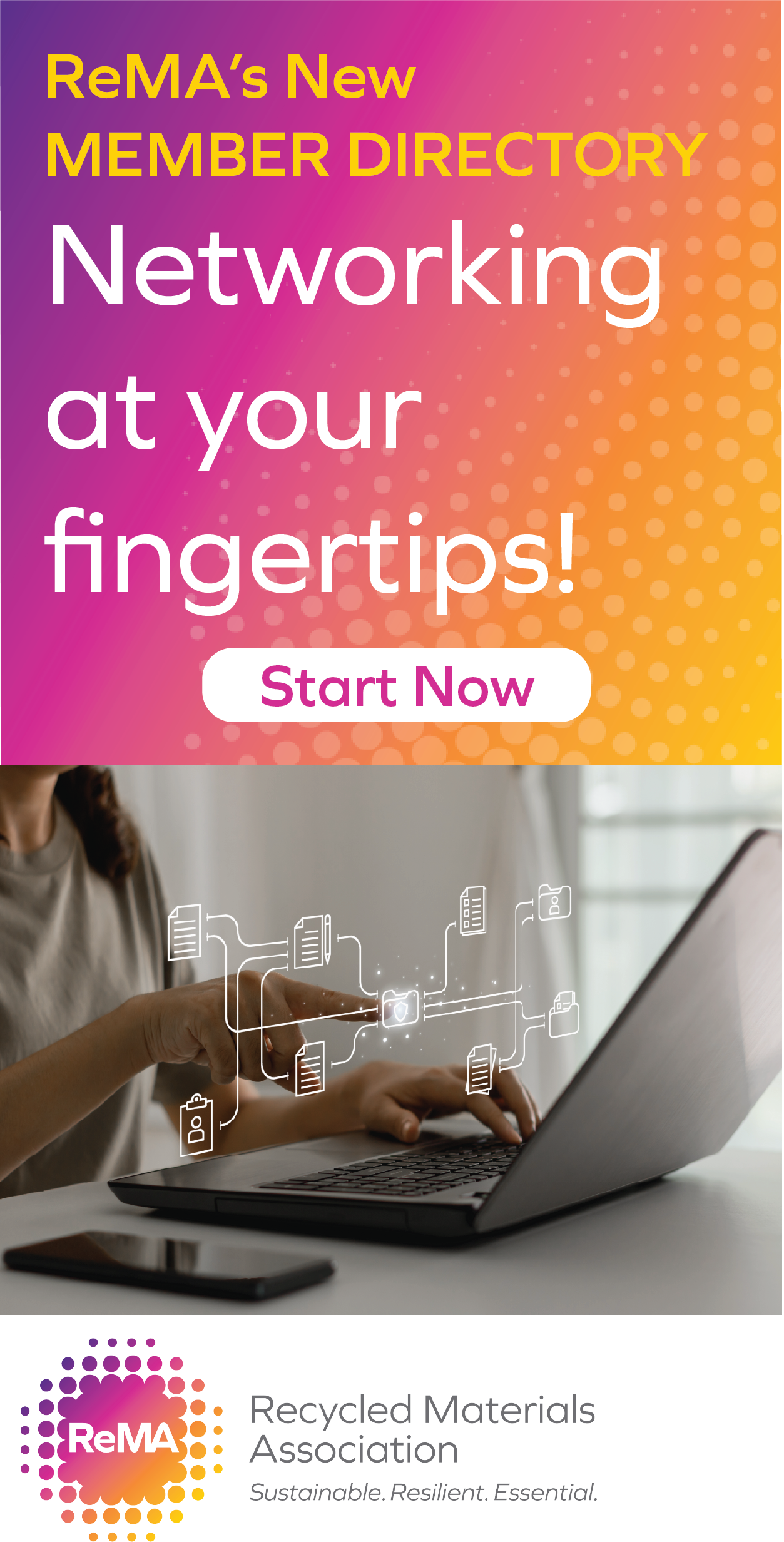The following article is from the session Youth Engagement: Educating Our Future on Recycling is Essential at ISRI2021. If you would like to watch this session in its entirety, you can still register for ISRI2021 here. This session, along with others, are available to attendees on demand.
One challenge facing the recycling industry is educating the public about the value of recycling and recycled materials. To that end, ISRI has partnered with JASON Learning, a nonprofit organization that focuses on science, technology, engineering, and mathematics (STEM) education, to develop a multilayered recycling education curriculum to K-12 students across the U.S.
In this session, Youth Engagement: Educating Our Future on Recycling is Essential, Peter Van Houten, general manager of Bob’s Metals Inc. in Portland, Ore., Brandi Harleaux, chief operations officer at South Post Oak Recycling Center in Houston, Lindsay Simpson, technology integration specialist at Genesee Valley Central School District (CSD), and Amy O’Neal from JASON Learning, shared how ISRI and JASON Learning’s partnership is instrumental in educating students and teachers about the importance of recycling and how recyclers can impact their local communities.
JASON and ISRI Partnership
JASON Learning’s goal is to inspire students through science and exploration and ensure all students have access and exposure to STEM education. The guiding principle behind the organization, O’Neal says, is showing students the science happening all around them and introducing them to STEM professionals in those fields will inspire them to learn more and possibly follow in a similar path.
Through the partnership, ISRI and JASON Learning developed an array of resources for grades K-12 covering all commodities. JASON reaches students through its curriculum, teacher training, an annual recycling poster and video contest, its recent computer game Scrap Titans, and through STEM role models. In particular, providing students the opportunity to meet STEM professionals helps students connect what they’re learning in the classroom to the real world.
Using the Recycling Module
For the 2018-19 school year, Genesee Valley CSD, a district in Belmont, N.Y., embedded JASON and ISRI’s recycling module into its classrooms. Simpson describes how the district was interested in decreasing its paper use and wanted to incorporate STEM learning. The district implemented the module across all grades, making necessary adjustments to meet grade level standards.
Each grade built on the previous grade’s work, so the process became meaningful for the students, Simpson says, knowing their older peers would rely on and use their work. To understand how much paper the district used, kindergarten and first graders collected and counted all the paper from the district. Students in second, third, and fourth grade transformed the data into charts and graphs and fifth and sixth graders turned the charts into infographics to share with the public. Middle and high school teachers incorporated the module into special education and elective classes including art, sports marketing, and film studies.
Recyclers Partnering with School Districts
Begin partnering with schools through building relationships with teachers, school counselors, and guidance counselors, Simpson advises. Students are often searching for opportunities to develop skills to prepare them for the world but don’t always know where to look. Companies can provide internships or apprenticeships for students who don’t follow traditional learning paths to practice and build valuable job skills.
Teachers are always looking for ways to make their lessons more engaging for students, Simpson notes, so finding ways to integrate recycling with current units and standards will help educators provide students with a meaningful application of skills. Another way to partner with school districts is through involvement with the local community such as sponsoring a team, serving as a judge in a local contest, or assisting with fundraisers.
How Recyclers Can Engage with the Community
Just as relationships are the key to partnerships with school districts, so too are relationships the backbone of community engagement. Building relationships with the school council, city council, or STEM leaders opens doors to opportunities with the community.
Harleaux recounted her experience partnering with a local Episcopal High School. Her company supplied aluminum cans for a chemistry class to create their own foundry and produce a mini aluminum melting project. In this process, Harleaux had an opportunity to introduce the school to the JASON Learning curriculum. “If businesses are looking to engage with the community, leverage what already exists,” she says.
Other ways to engage are through community activities such as participating in recycling drop-off programs or back-to-school drives. Recyclers can also get involved by connecting with local business leaders and legislators to further push for the importance of STEM education. These activities provide a dual opportunity to give back to the community and to share education resources about recycling. “I’m a big believer in maximizing opportunity,” Harleaux says.
Photo caption: (From top to bottom) Peter Van Houten, Bob’s Metals Inc., Amy O’Neal, JASON Learning, Brandi Harleaux, South Post Oak Recycling Center, and Lindsay Simpson, Genesee Valley Central School District discuss the partnership between ISRI and JASON Learning in the session Youth Engagement: Educating our Future on Recycling is Essential during ISRI2021.
Additional Resources













